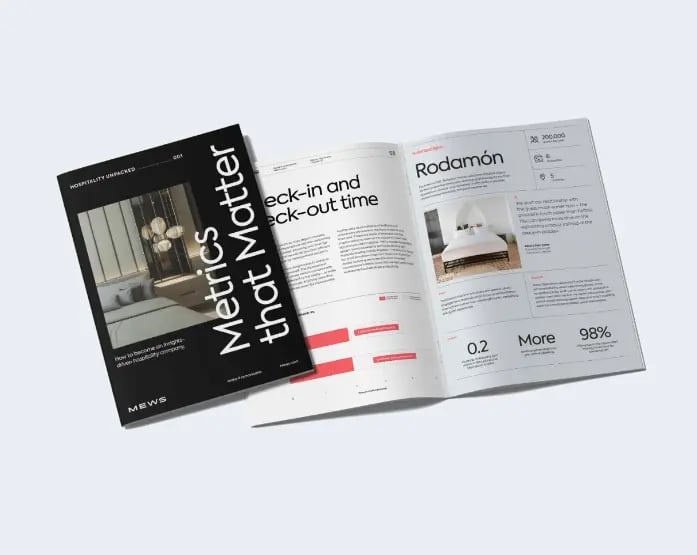As a hotelier, you're always seeking new ways to increase hotel revenue. Increasing a hotel's profitability determines long-term success – it requires careful planning and a deep understanding of customer behavior. You should also be open to adapting your strategy to a specific market. Fortunately, hotels can employ many effective strategies to increase revenue streams and maximize profits.
We'll look at simple ways to increase hotel revenue: analyzing and optimizing pricing, decreasing reliance on third parties, etc. With the right strategies and the right technology, your hotel can increase revenue and achieve sustainable growth in a competitive marketplace.
Table of contents
Simple ways to increase hotel revenue
Hotels can achieve optimal pricing by implementing revenue management strategies that lead to ideal occupancy levels. Dynamic pricing, segmentation and forecasting will help to increase your hotel’s bottom line. Additionally, you can use social media marketing and data analytics or leverage Hotel revenue management software to enhance revenue streams.
1. Optimize conversion points
Maximize revenue by optimizing your hotel's conversion points. Start with your online presence: manage your reputation to increase bookings from review sites and online tools like Google MyBusiness. The more conversion points designed to drive bookings you own (website and social media channels), the fewer commissions you pay to third parties, resulting in more margins.
2. Decrease your reliance on third parties
Third-party sites like online travel agencies (OTAs) bring bookings to your hotel, especially in periods of low demand. Although they offer good online visibility, their commissions cut into your profits. That's why you should have a healthy mix of direct and indirect channels – you won't need to rely only on third parties to generate sales.
3. Practice yield management
Yield management seeks to maximize revenue by offering potential clients the right price at the right time. Use it to understand how much of each inventory type to allocate to different types of demand. How does demand forecasting work? It uses data and industry trends to predict demand and set the price per night at a competitive rate.
4. Dynamic pricing
In the hospitality industry, demand is constantly changing. You can ensure consistent growth by adapting your pricing strategies to market conditions. Increase prices in periods of high demand and lower them when demand drops to increase occupancy. To practice dynamic pricing, you must track market events and competitor pricing. It will help you accurately forecast demand and stay ahead of the competition.

5. Embrace group bookings
Group bookings allow you to capitalize on marketing efforts and distribution costs while decreasing costs for guest acquisition. The excellent news about group bookings is that events, corporate groups and weddings usually happen in the low season when hotel rates are generally lower. Now there's a terrific opportunity to boost profit during periods of less demand.
6. Find ways to upsell
Ancillary revenue is key for driving valuable profit. There are so many ways to increase guest spending by capitalizing on the convenience of in-hotel services. Get inspired: transportation to and from the airport, parking fees, spa treatments, guided tours, room service, etc. Seeing how convenience is a major contributing factor to guest satisfaction, it’s a win-win.
7. Offer early check-ins and late check-outs
Early check-ins drive incremental revenue because they increase the average spend per booking. Plus, you don’t have to worry about acquisition costs because the guest requesting early check-in is already a paying client. Use this opportunity to upsell and contribute to your hotel’s bottom line. Remember, it’s easier to sell services when a guest is at your hotel, and early check-in increases the chance of consuming extra services.
8. Keep guests engaged
Engaging guests throughout their journey drives profit. When they book, offer upselling opportunities like early check-in, spa treatments or a guided tour. During their stay, use virtual concierge and push notifications to ensure your guests are aware of added services. Once they leave, offer them a loyalty discount. Finding a new customer is much harder than keeping one, so don't forget to stay in touch with your guests.
9. Packages & discounts
Package deals also boost the average spend. Make added services more attractive by including them in the offer, as guests generally don’t calculate how much added services cost or distinguish them from the room price. Package deals and discounts ensure ancillary profit during low season.
10. Implement a booking engine
Booking engines on your website have some upkeep costs, but it's nothing compared to the commissions you pay to OTAs. They allow your guests to book directly on your website or through social channels, which increases your margins. Taking advantage of cross-selling opportunities is simpler when guests come from direct sources.
11. Stay restrictions
During periods of high demand (special events in your city, long weekends, summer holidays), consider implementing stay restrictions, such as a minimum of two nights. This will guarantee occupancy and steady profit.
12. Use hotel revenue management software
Hotel revenue management software can help you optimize inventory and maximize profits. Part of achieving your profit goals is adjusting pricing and driving revenue by offering guests different booking options. With rate management in your property's reins, you can create rules, dependencies and restrictions. Practicing yield management will do wonders for your hotel's bottom line.
How hotel technology can help you increase revenue
The right hotel technology helps you streamline operations, enhance the guest experience and maximize existing revenue streams while also unlocking new opportunities for growth.
Seamless cross-sells and upsells
Mews empowers properties to drive more revenue through smart, automated upselling strategies across the entire guest journey. Guests can easily select early check-in, room upgrades, treats and services—with personalized offers presented at the perfect moment during booking, pre-arrival, or check-in. With Mews Payments, the entire process is frictionless: guests can confirm and pay for extras instantly, with secure, automated transactions that require no manual input from staff. This not only boosts ancillary revenue but also creates a seamless, elevated experience that keeps guests happy and operations running smoothly.
Curious how this works in practice? Watch our CEO, Matt Welle, break it down — showing how the right strategies boost revenue, elevate guest satisfaction, and drive real results.
Comprehensive space management
Traditional property management systems treat your hotel as just rooms and beds – leaving other revenue-generating spaces to be managed in separate tools or, worse, on paper. This fragmented approach limits efficiency and revenue potential.
Mews Spaces lets you manage and price any space and asset on your property – from meeting rooms and co-working areas to parking spots, lounges and even bikes. With flexible stay options ranging from hours to months, you can optimize every square meter. Guests can book these spaces alongside their rooms – streamlining operations, reducing errors and maximizing revenue by attracting short-term and long-stay guests alike.
Flexible booking options
Mews empowers hotels to offer a variety of stay durations tailored to guest needs:
- Hourly – increase turnover and revenue by booking spaces multiple times per day for meetings, interviews or private use
- Daily – monetize rooms and spaces for daytime use, offering guests convenience and hotels an additional income stream
- Monthly – simplify long-stay bookings for digital nomads, students or extended corporate assignments
This level of flexibility opens up new revenue channels and helps hoteliers optimize occupancy across different guest types and use cases. By diversifying your offering, you can attract a wider range of customers while maximizing your property's earning potential year-round.
Bookable services
From parking and bike rentals to spa treatments and event space, Mews allows you to create custom bookable services with configurable durations and pricing. These upsell opportunities not only enhance the guest experience but also unlock new revenue streams with minimal operational overhead.
Check out how Mews customers grow their revenue with Mews Spaces and Bookable Services:
Revenue optimization
A Revenue Management System (RMS) takes the guesswork out of pricing by automatically analyzing historical data, market trends and demand forecasts to help you set the ideal room rate.
With Atomize, a Mews company, you can automatically calculate time-based costs and leverage dynamic pricing to maximize income from underused inventory. Comprehensive occupancy reporting merges short- and long-stay data on a unified timeline – giving you actionable insights into space utilization and demand trends.
Conclusion
We’ve looked at the 12 ways to increase hotel revenue. By using technology and a mix of the right strategies outlined in this article, hoteliers can drive profit and boost the bottom line throughout the year.
Download our guide The Metrics that Matter

How do you evaluate the performance of your property? With a vast amount of data at your disposal, selecting the appropriate metrics is crucial for achieving success. This report delves into the hospitality metrics that will play a pivotal role in influencing operational, financial, and marketing decisions for contemporary hoteliers.

2026 Hospitality Industry Outlook
Download now
Table of contents
Hospitality hot takes straight to your inbox



.webp)
